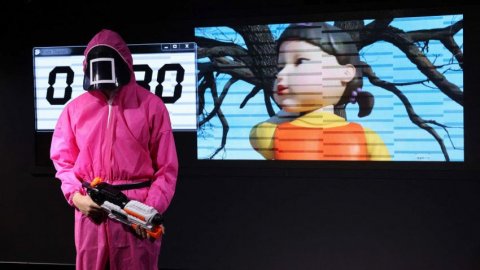Squid Game: petition calls for censorship in Italy, driven by the parenting crisis

Squid Game
Squid Game is creating emulation phenomena among the smallest, which is why a petition has been launched calling for its censorship in Italy. The crusade against the Netflix series was initiated by the Parliamentary Commission for Children and Adolescents from the Carolina Foundation (dedicated to Carolina Picchio, the first confirmed Italian victim of Cyberbullying in our country).The text of the petition, signed by almost 2,500 people at the time of writing this news, is eloquent on the objectives it proposes:
"In the face of the dismay of mothers and nursery school teachers, good intentions are not enough, but we need a concrete action ". That of the Carolina Foundation - the non-profit organization committed to the welfare of minors online - is not a censorship act, but responds to the need to face the defeat of parental controls and the crisis of parenthood. A debacle exposed by social media and, above all, by the dozens of reports that the experts for digital security of the new generations have collected from all over Italy. "My son hit his little friend while playing Squid Game." "My daughter's backpack was knocked out of the classroom window because she lost Squid Game, she doesn't want to leave the house anymore." My kids weren't invited to their partner's party, because they don't want to play Squid Game. " These are just some of the testimonies received by the Carolina Foundation, an alarming sample compared to a series that tells about violence, alienation and addictions with the simplicity of childhood games.
The authors of the petition seem to realize that the problem is not so much the series as the "crisis of parenthood", read parents unable to educate their children, as well as the uselessness of parental control of content in an era in which these can reach users through a multitude of different channels, but have found no other solution than to propose the censorship of Squid Game, showing a great helplessness in the face of current reality.
It is no coincidence that the Netflix itself suggests watching the Korean series for users over 14 years of age, yet Squid Game, which is beating all viewing records, goes wild among the very young. Word of mouth is unstoppable, so much so that the series goes viral, even among children. The text of the petition continues, which evidently does not consider how many of the young people have had access to the series indirectly, by watching clips shared on social networks and not necessarily on the video streaming platform.
Anti-Squid Game petition on Change .org
Have you noticed any errors?
There’s An Actual Reason Squid Game’s VIPs Are So Terrible
Squid Game
NetflixBy now, you’ve watched Squid Game, as has pretty much every other person on the planet, and you may have noticed something a lot of viewers did. While the show is full of great performances from its Korean cast, when it came to its Western actors, the gold-masked VIPs, something just felt…off.
The dialogue, the acting, it was quite poor compared to the rest of the production. The VIPs were widely criticized on social media for their acting, and some of the actors took it personally while others didn’t. But what I found interesting is that there’s an actual explanation for why this came off so poorly, and why you may have seen this happen in other foreign language productions, where the English-speaking actors aren’t as good as the rest of the cast (I’ve certainly seen this phenomenon before).
In an interview with The Guardian, VIP One actor John D Michaels explains what can go wrong:
“It’s different for every show, but non-Korean performers often act with dialogue that is translated by a non-native – sometimes even by Google Translate – so it can sound unnatural,” he said.
Squid Game
NetflixThe other problem was the setting for 90% of the VIP’s lines:
'We were all wearing very heavy plaster masks, and sitting on couches that were at least 20-30 feet away from the closest VIP. We all had to yell our lines vaguely into the air, which added to the weird tonality of the delivery.”
The VIPs weren’t also given that much context or backstory for their characters. They were simply total to play “total idiot dirtbag millionaires” and run with that. The assumption that Squid Game audiences have is that these are rich and powerful Westerners, but their identity being a mystery is a core part of the Squid Game lore.
Past that, other reasons are brought up. Korean editors didn’t always know what the right take was to use. An example was given of a take when an actor said “I’ll give anyone some slack” instead of “I’ll cut anyone some slack” and the wrong phrase was used in the final cut. Also, Korean dramas have sort of heightened, over-the-top acting on purpose at baseline, and Western audiences may not recognize that as much in the Korean dialogue and performances, but it’s more noticeable when the Western actors are doing it.
One thing that the VIP actors themselves are not likely to bring up is that maybe yes, there is a more limited selection of Western actors available to film in Korea. And that can mean a smaller talent pool and yes…worse acting, potentially.
So, all of these factors combine to yield the types of performances we saw in Squid Game which just didn’t come across well. It is a safe assumption the show is not done with the VIPs for future seasons, but hopefully they can absorb some of this feedback and it can be used to improve those characters for season 2 and beyond.
Follow me on Twitter, YouTube, Facebook and Instagram. Subscribe to my free weekly content round-up newsletter, God Rolls.
Pick up my sci-fi novels the Herokiller series and its audiobook, and The Earthborn Trilogy, also on audiobook.